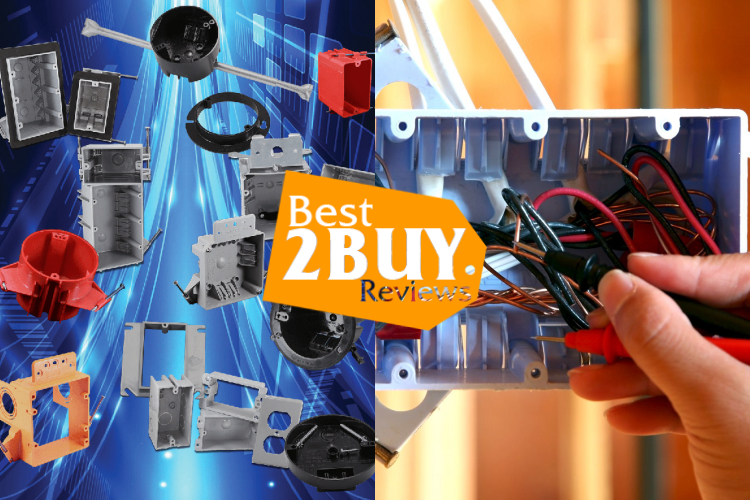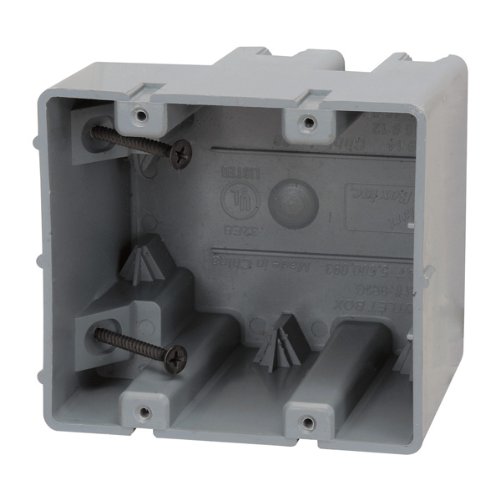What Are Electrical Outlet Boxes? - Types & Uses

What Are Electrical Outlet Boxes?
Electrical outlet boxes, also known as junction boxes or electrical boxes, are essential components in electrical installations. They are typically made of metal or plastic and serve as protective enclosures for electrical connections, wiring, and devices. These boxes are installed in walls, ceilings, or floors to house electrical outlets, switches, light fixtures, and other electrical components.
Uses Of Electrical Outlet Boxes
Electrical outlet boxes are essential components in electrical installations. They serve several important purposes, including:
- Safety: Outlet boxes provide a protective enclosure for electrical connections, preventing accidental contact with live wires. They help reduce the risk of electrical shocks and fires by containing potential sparks or short circuits.
- Mounting electrical devices: Outlet boxes are used to securely mount electrical outlets, switches, dimmers, and other devices. They provide a stable and flush surface for attaching these components, ensuring they are properly installed and easily accessible.
- Wire management: Outlet boxes help organize and manage electrical wiring. They provide a central location for connecting wires, making it easier to route and secure them. This helps prevent tangled or exposed wires, reducing the risk of damage or electrical hazards.
- Fire protection: Outlet boxes are designed to contain sparks or flames that may occur due to electrical faults. They are typically made of fire-resistant materials, such as metal or non-combustible plastic, which help prevent the spread of fires.
- Aesthetics: Outlet boxes can be used to enhance the appearance of electrical installations. They can be recessed into walls or ceilings, allowing electrical devices to sit flush with the surface. This creates a clean and seamless look, especially when combined with decorative cover plates.
Types Of Electrical Outlet Boxes
There are several types of electrical outlet boxes commonly used in residential and commercial buildings. Here are some of the most common types:
- Metal Electrical Boxes: These boxes are made of metal, typically steel, and are commonly used for both surface-mounted and flush-mounted installations. They provide good protection and are durable.
- Plastic Electrical Boxes: These boxes are made of non-metallic materials, such as PVC or polycarbonate. They are lightweight, easy to install, and resistant to corrosion. Plastic boxes are commonly used in residential applications.
- Octagon Boxes: Octagon boxes are typically made of metal and have eight sides. They are commonly used for mounting light fixtures or ceiling fans. Octagon boxes have knockouts for cable entry and are available in various depths.
- Square Boxes: Square boxes are usually made of metal and have four sides. They are commonly used for switches, outlets, and junctions. Square boxes come in different sizes and depths to accommodate various wiring needs.
- Gang Boxes: Gang boxes are larger boxes that can accommodate multiple switches or outlets. They are available in different configurations, such as single-gang, double-gang, triple-gang, etc., depending on the number of devices they can hold.
- Weatherproof Boxes: Weatherproof boxes are designed to protect electrical connections from moisture, dust, and other environmental elements. They are commonly used for outdoor installations, such as on patios, decks, or in wet locations.
- Ceiling Boxes: Ceiling boxes are specifically designed for mounting light fixtures or ceiling fans on ceilings. They are available in different shapes and sizes to accommodate various types of fixtures.
- Floor Boxes: Floor boxes are installed in the floor surface and are used to provide power or data connections in commercial or residential settings. They typically have hinged or removable covers to protect the outlets when not in use.
Things To Consider When Choosing An Electrical Box
When choosing an electrical box, there are several important factors to consider. Here are some key points to keep in mind:
- Size and Capacity: Determine the size and capacity of the electrical box based on the number and size of the wires, switches, outlets, or other devices that will be installed in it. Ensure that the box is large enough to accommodate all the necessary components.
- Material: Electrical boxes are typically made of metal or plastic. Metal boxes provide better protection against fire and are more durable, while plastic boxes are lighter and easier to work with. Consider the specific requirements of your installation and choose the appropriate material accordingly.
- Mounting Options: Electrical boxes can be surface-mounted or recessed. Surface-mounted boxes are attached to the wall or ceiling surface, while recessed boxes are installed inside the wall. Determine which type of mounting is suitable for your project and select the corresponding box.
- Box Type: There are various types of electrical boxes available, such as junction boxes, switch boxes, outlet boxes, and more. Choose the appropriate box type based on the specific application and the devices you plan to install.
- Box Depth: Consider the depth of the electrical box to ensure it can accommodate the wiring connections and devices properly. If you have bulky devices or multiple wires, you may need a deeper box to provide enough space.
- Code Compliance: Ensure that the electrical box you choose complies with local electrical codes and regulations. This ensures safety and prevents any potential issues during inspections.
- Accessibility: Consider the accessibility of the electrical box. If it will be hidden behind a wall or ceiling, ensure that it has an access panel or cover that can be easily removed for maintenance or repairs.
- Weatherproofing: If the electrical box will be installed outdoors or in a damp location, choose a weatherproof or waterproof box to protect the electrical connections from moisture and other environmental factors.
- Compatibility: Ensure that the electrical box is compatible with the wiring system you are using. Different boxes may have specific requirements for wire connections, grounding, or other factors.
- Brand and Quality: Choose electrical boxes from reputable brands known for their quality and reliability. This ensures that the box will perform well and last for a long time.
By considering these factors, you can select the most suitable electrical box for your specific installation, ensuring safety, functionality, and compliance with electrical standards.











